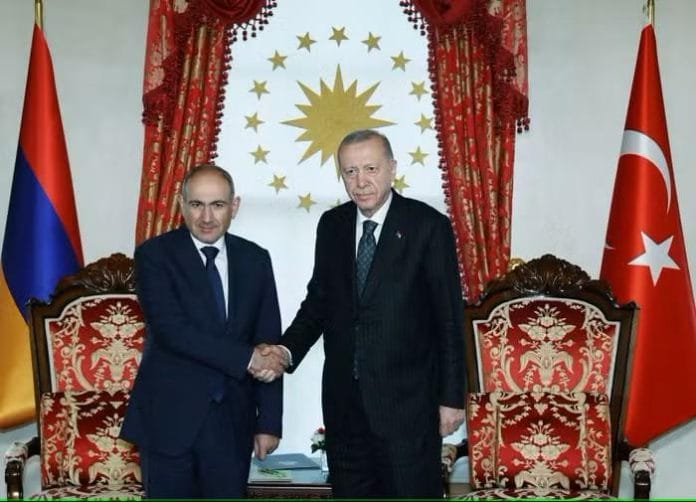Thank you dear subscribers, we are overwhelmed with your response.
Your Turn is a unique section from ThePrint featuring points of view from its subscribers. If you are a subscriber, have a point of view, please send it to us. If not, do subscribe here.
Turkey is our enemy, but that enmity must be managed, said Nikol Pashinyan in May 2021 before winning snap election that was declared in Armenia in wake of the protests against the peace treaty signed with Azerbaijan following a war, the previous year. Finally, the words seem to be translating into policy as the Armenian PM visits Istanbul to meet President Erdogan this week. Despite opposition at home, Yerevan described the visit to Türkiye as historic for peace in the Caucasus as the world witness growing conflicts in eastern Europe and west Asia.
The essential purpose for the visit, which came a day after Azerbaijani President Ilham Aliyev concluded his visit to Türkiye, was to work on a normalization process between the two countries. Special envoys for the normalization process were appointed by both sides in late 2021 and building up on that Pashinyan visited Türkiye in 2023 following Erdogan’s election victory and earlier this year halted Armenia’s campaign of international recognition of 1915 mass killings of Armenians during Ottoman rule as ‘genocide’.
Relations between Türkiye and Armenia had been fraught since decades due to which the border between the two was closed. Further complications were added due to consistent Turkish support to Azerbaijan during the conflict with Armenia. In 2020, within a six-week war over the Armenian enclave of Nagorno-Karabakh, Azerbaijan landed a decisive defeat on Armenia and Turkish Bayraktar drones were instrumental in it.
Pashinyan, who has been leading his country post the velvet revolution in 2018, seems to maneuver in a way that is unusual in a post 2008 world order. His visit to Türkiye comes as a surprise to laymen like us. Thomas de Waal, a senior fellow at Carnegie Europe told AFP that this is Armenia’s attempt to break out of isolation and build ties with the larger western world for which normalization with Türkiye is necessary. However, a western push might be needed on the Turkish side, for Pashinyan to reap utmost benefit of this politically expensive diplomatic move.
Given its geography Armenia, a part of now disintegrated Soviet Union, had a considerable influence of Russia over its security structure. This visit can also be seen as Armenia attempts to reduce its dependence on Russia. In the aftermath of the Russia-Ukraine conflict, the economic relationship between Russia and Armenia has grown stronger but the public confidence in Russian security guarantee has reduced and as a result Yerevan has frozen its participation in the Moscow led security pact, CSTO (Collective Security Treaty Organization). Subsequently, Armenia has also signed on to the Rome Statute and acceded to the International Criminal Court, which has issued an arrest warrant against Russian president Putin. While there are legitimate discussion going on within Armenia about the limitation of western capacity and desire to help, given both historical and geographical reasons, it recently passed a law to establish the legal basis to begin its path towards a full EU membership. With this shift from Russia towards Europe, Armenia finds itself in strategic convergence with Türkiye.
One can feel a cruel déjà vu if we look at the events of September-October 2023. Weeks before the Hamas attack on Israel and the massacre of Palestinians that followed, an ethnic exodus of tens of thousands of Armenians from Nagorno-Karabakh took place after Azerbaijan attacked the breakaway region and ordered the fighter groups there to disarm. These events recall the historical parallel between the post-World-War-II experiences of Palestinians and the post-World-War-I experiences of Armenians. In June 2024, Armenia recognized Palestine as an independent state as the Gaza death toll came close to 40,000. Here, the fact that Israel, along with Iran and Türkiye was one of the largest suppliers of arms to Azerbaijan during the 2020 war must also be taken into consideration.
After Putin’s war on Ukraine, Isreal-Gaza war and recently war on Iran initiated by Netanyahu, military measures are seemingly taking precedence over patient diplomatic approaches across the globe. Recently, while I suffered a career setback, I turned towards a film on Yamamoto Isoroku, the Japanese Navy admiral during World-War-II, who was well aware of the eventual fate of a war with America. Someone like him with a stellar war record in the early 20th century, opposed Japan’s involvement in a war with America but was eventually forced to fight it. And yet he fought every battle to end the war and sue peace is an underread lesson of history just as persecution of the Armenian people. In these times when narratives of victory are built upon stalemated conflicts, Armenia under PM Pashinyan provides a unique example. A country making peace with the enemy after the most definite defeat since Pakistan’s in 1971.
These pieces are being published as they have been received – they have not been edited/fact-checked by ThePrint.


